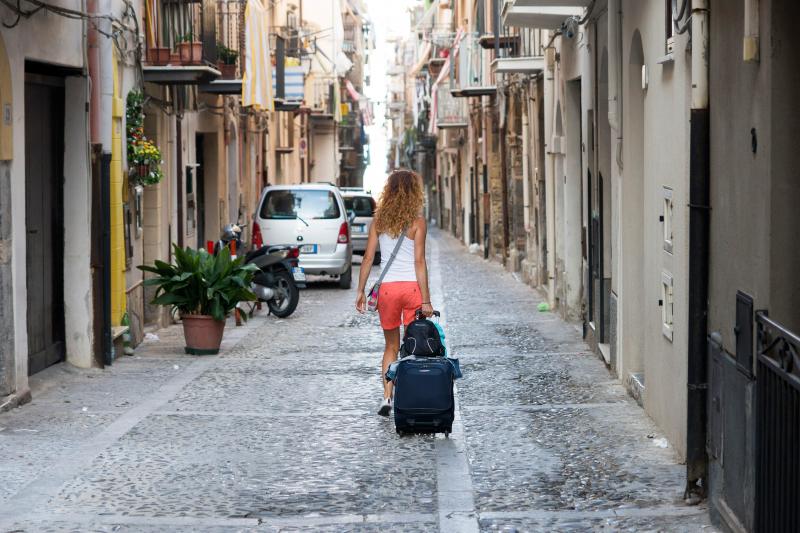With the post-pandemic bump in tourism, Italy is hotter than ever. This summer travel season, however, is shaping up to be a real “scorcher” — price-wise, that is.
Rates for beds in hotels, motels, hostels, agriturismi (farmstays) and holiday villas have been steadily ticking up, leaving many visitors to Italy with sticker shock — or worse, no room at the inn.
Dynamic pricing is being blamed for significant hikes in room rates all over Italy.
What is dynamic pricing?
You already know what dynamic pricing is, even if you aren’t familiar with the term. Simply put, it’s a cost-management system that determines charges based on market supply and demand. It’s basic economics: As supply increases, prices go down, and as demand grows, they shoot up.
And demand — in case you haven’t noticed how many of your neighbors, friends and social media acquaintances seem to be traveling to Italy lately — is booming. One report from the Italian National Institute of Statistics (ISTAT) found that some 196 million tourist stays were recorded in the summer 2022 period (which the report defined as July to September). While the numbers didn’t quite reach 2019 levels (205 million), the upswing after a slow and restrictive 2021 swayed some small and independently owned hotels’ approaches to their pricing strategies for 2023.
Dynamic pricing strategies have been used for years by the airline industry, rideshare companies (i.e. Uber’s surge pricing), concert ticket sellers and retailers. Later, large hotel chains, third-party online booking agencies like Booking.com and private hospitality platforms like Airbnb — which, according to the Italian Travel and Tourism Federation, saw a 90% increase in private room bookings in Italy between 2021 and 2022 — followed suit. But this approach has not always been the norm among smaller hotels and businesses in Italy.
Shifting away from static pricing
Steve Brenner (L) and Linda Martinez (R) of The Beehive, Rome
Properties use external software and algorithms to analyze market conditions in order to optimize profits based on critical factors such as occupancy, time of booking, historical rates — what was charged for the same period the prior year — and nearby competitors’ advertised prices.
What’s on in the surrounding area is also a factor: Think major concerts, high-profile art exhibitions, sporting events and national holiday periods.
This might seem obvious. But surprisingly, it hasn’t always been standard. When The Beehive, a popular boutique hostel in Rome, opened its doors in 1999, owners Linda Martinez and Steve Brenner followed a static price model that was an industry standard for decades.
“The going rate was published in guidebooks and on our website,” Brenner told Italy Magazine.
Room tariffs were set at a fixed amount, deviating only slightly to take into account high and low seasons (i.e. summer versus winter). For all intents and purposes, room rates were fairly set in stone.
But with the advent of more accessible technological tools, smaller independent businesses in the hospitality sector were able to get into the adjustable cost-setting game.
Brenner and Martinez admit they were initially hesitant about adding dynamic pricing to their booking strategy as Covid-related travel restrictions first eased and tourists came back. But Covid-surviving hospitality businesses like theirs are still under the unique pressure of making up for time and revenue lost to lockdowns and the resulting dip in tourism numbers.
Italian daily La Repubblica reported that new data from the Federconsumatori National Observatory showed that a double room at the seaside in summer 2023 costs an average of €252 per night, compared to €196 in 2022 and €157 in 2021. In general, the average increase in hotel pricing across geographical settings ranges between 18% and 28%. The exception is mountain-area hotels and resorts, where prices are going up by about 8%.
Why it’s not all bad news for buyers
The way Brenner looks at it, charging more for rooms helps out his bottom line — sure — but it also benefits guests. Many owners of hard-hit small businesses are now in a position to provide better services and sometimes overdue upgrades.
Brenner and Martinez were able to install air conditioning units in several rooms that didn’t have them last year, replace older mattresses, and amp up their calendar of social events for guests, like evening aperitivi in the boutique hostel’s garden with a modest €4 charge for a Spritz and pizza.
“If we don't stay in line with other properties’ prices, we also can’t keep up with the quality,” Brenner said. “We’re able to do a lot more for our guests.”
In general, the old adage of “early birds getting the worm” still applies. The earlier you book, the more likely your wallet will take less of a hit.













